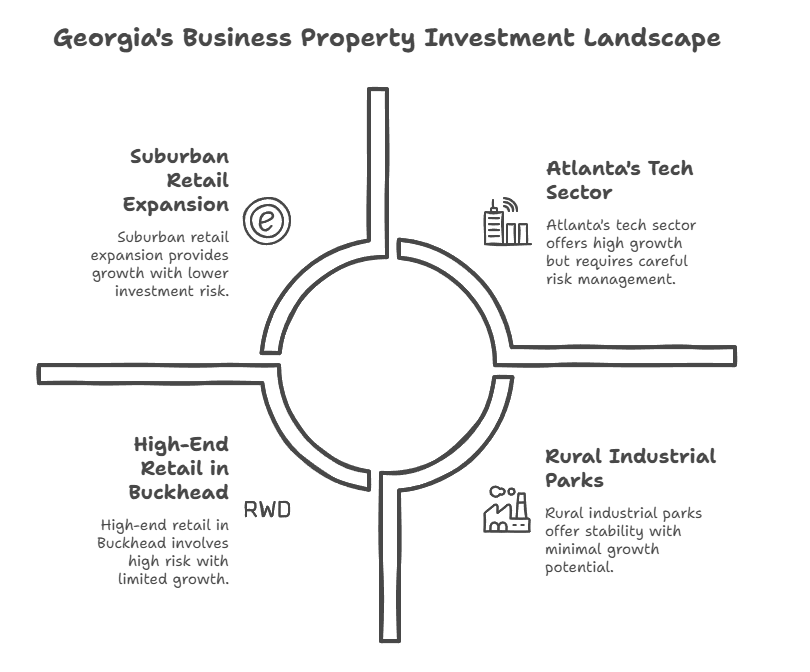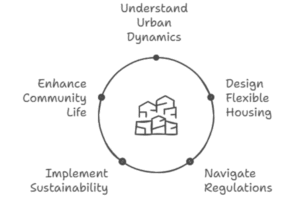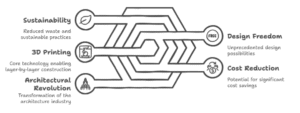You know, thinking about Georgia’s economy and how favorable its environment is for businesses – it’s genuinely a prime place for companies, truly, of any size. Whether you’re looking in vibrant Atlanta, its rapidly expanding suburbs, or venturing further out into the state, the Peach State offers a real range of diverse opportunities for anyone thinking about investing in business properties. Over years of navigating deals across various sectors here – like industrial, retail, and office properties – I’ve had a firsthand look at the strategies that consistently lead to success, and some of those common pitfalls.
Honestly, that’s precisely why I felt compelled to put this guide together. My aim is to provide you with genuinely actionable insights, strategies I’ve seen proven, and some practical, “in the trenches” tips you’ll need to feel truly confident about finding the right business properties in Georgia. It doesn’t matter if you’re an experienced investor or a business owner just starting that crucial search – this guide will walk you through how to identify promising markets, understand and potentially leverage financial incentives, and get a handle on navigating the regulatory landscape. The goal is always to maximize your return and set your business up for growth.
Georgia’s Business Property Landscape: What You Need to See
Key Economic Drivers Shaping Things
Georgia’s pretty robust economy is a major engine driving the demand for business properties. Its diversified economic base, combined with that generally business-friendly environment, makes it a very attractive place for companies looking to expand or relocate here. We’ve seen impressive job growth lately, particularly strong in areas like logistics, technology, and advanced manufacturing. The state consistently ranks high nationally for ease of doing business.
Population trends are another massive factor. Georgia’s population has been climbing steadily, creating significant demand for retail, office, and industrial space. This influx also means a larger, potentially more skilled workforce, a big draw for companies considering a move. Beyond the major drivers, don’t forget film/entertainment and agriculture; they also fuel demand and unique local opportunities.
Taking the Pulse of General Market Trends
The commercial real estate market in Georgia mirrors the state’s strong economic fundamentals. While specific numbers are dynamic, the overall trend points towards continued growth, although you’ll see variations by region. Market analysis indicates vacancy rates in key areas like industrial and logistics remain quite tight, signaling healthy demand. Rental rates, particularly in highly desirable locations, have seen steady upward pressure.
Certain sectors perform better. Industrial and logistics continue to shine, heavily driven by e-commerce growth and supply chain efficiency. Warehouse and distribution centers are in high demand. The office sector faces headwinds due to remote work shifts, but well-located, modern Class A spaces are still attracting tenants. Retail is evolving; emphasis on ‘experiential’ retail and mixed-use developments is growing as developers adapt.
Finding That Perfect Spot: Exploring Key Georgia Markets
Atlanta: The Unavoidable Hub
Atlanta really is the undeniable economic heart of Georgia, offering a vast range of opportunities for businesses seeking commercial properties. As a major transportation nexus and a center for finance, technology, and media, Atlanta attracts diverse businesses. Areas like Midtown are popular with tech and creative firms (vibrant atmosphere, university proximity). Buckhead, known for upscale retail/dining, is prime for high-end retail and corporate offices.
However, investing in Atlanta also comes with significant challenges. High property values and intense competition require careful analysis and creative deal-making. Navigating zoning and permitting here can be complex. I once worked with a client who secured property in Midtown, only to find local regulations prevented its specific use for his business. It was a frustrating lesson in upfront zoning checks.
Suburban Growth Opportunities
As Atlanta expands and becomes more expensive, many businesses find attractive alternatives in surrounding suburban markets like Alpharetta, Roswell, and Cumming. They offer a compelling blend: potentially lower costs, access to a skilled workforce, high quality of life. These areas attract families/young professionals seeking balanced lifestyles, creating robust demand for diverse businesses.
Alpharetta, for instance, has become a tech hub, attracting startups. Roswell maintains a charming downtown appealing to small businesses/restaurants. Cumming has seen rapid population growth, creating opportunities for retail/service businesses. When I personally started exploring investments outside the immediate perimeter, focusing on areas like Johns Creek and Suwanee, I saw distinct trends emerging. Key in suburbs? Understand unique demographics and needs of that local population.
Exploring Regional Georgia
Beyond Atlanta/suburbs, Georgia presents fascinating regional opportunities. Savannah, historic charm/bustling port, is key for logistics/tourism. Augusta (Masters Tournament) attracts hospitality/service. Columbus (manufacturing/military) offers opportunities in defense/industrial sectors.
Each market has distinct character/complexities. Savannah’s historic district presents unique zoning/preservation hurdles. Augusta’s economy gets a significant boost from Masters tourism. Columbus benefits from the relationship with the military base. Understanding these nuances is essential for informed regional investment. Personally, by spending time in these regional areas, I’ve found genuinely valuable opportunities overlooked by others focusing only on Atlanta. Requires legwork, but can pay off.
My Top Tips for Investing in Georgia Business Properties
Truly Understand Your Target Market
Blindly investing in business properties without a clear, granular understanding of your target market in that specific location? Recipe for potential disaster. Successfully investing starts with identifying ideal locations where a business can thrive. Imperative to do solid market research within that precise location to understand what business opportunities genuinely exist there. Do local demographics support your business? What are industry trends in that exact location relative to your planned business?
One of the very first things I look at is the local and surrounding customer base. Who lives/works there? Needs/spending habits? Analyzing census data, consumer reports by zip code, observing traffic patterns around competitors provides crucial insights. Knowing your target market is critical for business success, but equally important for real estate success. You need a location suitable for reaching that target customer. If I could advise my younger self: always perform detailed customer analysis upfront. Without a viable base, business is likely dead on arrival, regardless of how good the property looks or if you secured debt. The customers have to be there.
Actively Look for Growth Corridors
One strategy I’ve applied with considerable success is investing along “growth corridors.” Areas experiencing – or poised for – significant future development from infrastructure improvements, transportation projects, or new industry investments. Looking at transportation is key. When logistics is planned, meticulous consideration goes to population growth near hubs and proximity to major interstates (I-75, I-85, etc.).
A potential future growth corridor example: areas around planned logistics/industrial expansions north of Savannah, like Bryan or Effingham Counties, driven by port activity. Or areas west of Atlanta where new logistics parks are developing along key interstate arteries. Always watch for official announcements from GDOT, local development authorities, corporations about major projects. A new highway exit or public transport expansion nearby can dramatically increase a property’s accessibility/value. But most important? These corridors must coincide with where your target customer base either is, or is projected to grow. As these areas do develop, new local or state incentives may be applied to encourage more business development there. Pays to be ahead.
Embrace “Driving for Dollars”: Get Your Boots on the Ground!
Listen, while online research/data analysis are valuable, nothing truly beats getting physically out there. I call it “driving for dollars.” Get in your car, pick a target area, and drive. Look for opportunities others miss. Vacant properties with potential? Area undergoing revitalization? Talk to local business owners – ask about experiences, community needs. Their ground-level insights can be gold.
I could share personal stories of valuable property leads or market insights discovered solely by physically driving areas like parts of Gwinnett County. Not only gain a deeper understanding of the physical real estate market, but often connect with local property/building owners. They may not be sophisticated investors, and lack resources to market vacant spaces. Grateful when new business shows interest. Getting out there helps intuitively understand local zoning – seeing how properties are used. Informs future strategy. More importantly, relationships with owners/community by being physically present are often most valuable, lasting a lifetime, creating future opportunities.
Navigating Financial Incentives and Tax Benefits
Leveraging State Incentives
Georgia aggressively attracts businesses through state-level financial incentives/tax benefits. Understanding and leveraging these significantly reduce costs, improve return. Georgia Job Tax Credit: credit for each new eligible job (higher in counties with greater economic need). Investment Tax Credit: credits for investments in new/expanded facilities (property, equipment). Amount depends on project location and jobs created (check georgia.org). Strategic industries (manufacturing, tech, telecom) often qualify for additional benefits.
These incentives aim to encourage job creation, investment, and economic growth statewide. For a comprehensive list/criteria, georgia.org is the official source. Highly advised to work with a tax professional specifically knowing Georgia landscape/business incentives. Ensures you apply for all eligible programs. Don’t leave money on the table.
Finding Local Incentives Too
Beyond state programs, many local governments – cities/counties – offer additional incentives to attract businesses. Incentives vary. Property tax abatements: reduce the amount paid for set period. Local Development Authorities (dlcda.com): assistance with financing, infrastructure needs, site selection. May designate areas as Enterprise Zones or Opportunity Zones (dca.georgia.gov): provide extra tax benefits/incentives for investing within defined boundaries.
Gwinnett County, suburban Atlanta, has provided grants/assistance to companies creating jobs/investing. Cities with historic districts (Savannah, Macon) often offer incentives for businesses renovating/locating in those areas. To uncover specific local incentives for exact location, contact the economic development agency for that specific city/county. Like finding hidden money if you know where to look/who to ask. Requires digging, payoff can be substantial.
Permitting and Regulations: Acknowledge and Navigate
Understanding Zoning Regulations
Navigating local zoning is a crucial aspect of investing in Georgia business properties. Zoning dictates how land is used (building types, density, restrictions). Failing to comply leads to costly delays, fines, even closure. Example: Client secured land for manufacturing, found parcel zoned only retail/office. Frustrating, costly lesson because zoning wasn’t checked before acquisition.
Common issues: setbacks (distance from property lines), parking requirements, restrictions on specific business types. Always consult the official local zoning ordinance before purchase/lease. Many cities/counties have online maps/resources. When in doubt, engage a local land use attorney/consultant. Also check HOA/COA CC&Rs if applicable – they carry significant legal power, and can impact use even if city zoning allows.
Handling Environmental Regulations
Businesses in Georgia must comply with environmental regulations (Georgia EPD). Aim: protect air/water, manage waste, prevent pollution. Depending on business type, may need environmental permits or assessments.
Essential to conduct environmental due diligence before purchase/lease, especially properties with history of industrial/contaminating uses (old gas stations, dry cleaners). Typically starts with Phase I Environmental Site Assessment (ESA): historical research, site visit, interviews to identify potential contamination. Usually non-intrusive. If Phase I suggests issues, Phase II ESA (testing) might be needed. Ignoring these regulations/potential contaminants leads to significant fines, costly remediation, and reputational damage. Partnering with a qualified environmental consultant is not optional; crucial for compliance/avoiding massive problems. As core strategy: I never invest without satisfactory environmental assessment – minimum Phase I – completed/reviewed. Risk too high skipping this step.
Georgia’s business property market holds tremendous potential. Unlocking it: knowledge, strategy, tireless due diligence, building network. Understanding market dynamics, identifying opportunities, navigating legal/financial with expert help, building relationships – positions you for success. These fundamental steps, applied consistently, are what I’ve used and rely on; instrumental in building my financial future here. My net worth, comfortably over $10 Million, is a direct result of applying these principles year after year.
I am committed to helping others navigate this market, achieve goals here. Whether looking for in-depth guidance, exploring properties, needing assistance with any aspect (analysis, site selection, financing, closing) – please don’t hesitate to reach out. Let’s connect and talk. Let’s work together to explore and unlock the potential of Georgia business real estate, build toward a brighter, more successful future, together.



